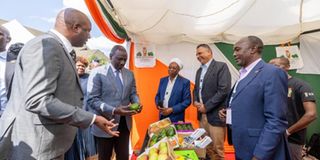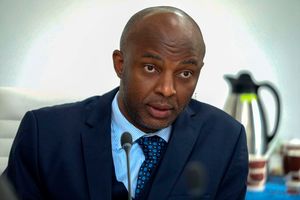
Murang'a Governor Irungu Kangata (left), President William Ruto (second left) and other attendees of the Murang’a County International Investment Conference on June 13, 2025.
Murang’a County is famed for producing some of Kenya’s most influential figures in the national economy, who control a significant market share in the Nairobi Securities Exchange.
It is home to political and business giants under caucuses such as the Council of Eminent Persons and the Mt Kenya Foundation. These groups are known for their financial muscle. A case in point is when this moneyed group raised enough funds for a presidential campaign within an hour.
In a 2014 article titled; The Mystery of Success, former Information Principal Secretary Dr Bitange Ndemo said that Murang’a’s Rwathia village arguably contributed almost 20 per cent of Kenya’s Gross Domestic Product and controlled nearly half of the stock market.

Murang'a Governor Irungu Kangata (left), President William Ruto (second left) and other attendees of the Murang’a County International Investment Conference on June 13, 2025.
But despite this glowing legacy, the county suffers from underdevelopment. It lacks significant industrial activity and remains heavily dependent on subsistence farming, with widespread unemployment.
Those who venture into livestock and crop farming grapple with cattle rustlers, crop thieves and exploitative brokers who take advantage of farmers’ limited options.
This has prompted Governor Irungu Kang’ata to organise a two-day conference that was held from June 13 to highlight investment opportunities and revive Murang’a’s dream of attaining city status.
Speaking to Daily Nation on Tuesday, Governor Kang’ata said the county aims to attract investors, business leaders and government officials to unlock new opportunities especially in the manufacturing sector.
“Industrialising this county requires collaboration between the private sector and government, with improved quality of life for residents as the ultimate benchmark,” the governor said.
Mr Kang’ata added that all county departments have been trained to align with the industrialisation plan, with the county assembly tasked with legislating policies to support the agenda.
“For countries to grow economically, history has shown that they must transition from primary production to value addition and manufacturing. This is how the West prospered and similarly, East Asia has lifted millions out of poverty within a generation. Now it’s Murang’a’s turn to stand out and be counted,” he said.
The county is home to captains of industry like Equity Bank Chief Executive Officer Dr James Mwangi, former Equity Bank board chairman Peter Munga, Britam Holdings Plc Managing Director Benson Wairegi and investment banker Jimnah Mbaru.
Other business magnates from Murang’a are former Nairobi Institute of Business and Technical Studies chief executive officer Liz Wanyoike and the late Chris Kirubi as well as media mogul Samuel Kamau (SK) Macharia.

Murang'a Governor Irungu Kangata (second left, front), President William Ruto (front, centre) and other attendees at the Murang’a County International Investment Conference on June 13, 2025.
Mr Munga has been committed in his efforts to uplift the county by investing in horticulture, education, tea and concrete poles. This has provided job opportunities for Murang’a residents.
During a Mt Kenya Foundation meeting held in Kandara on June 17, 2022, Mr Munga said there was need for the county government to embrace private sector investment to drive value addition, employment and wealth creation.
"Our prayer all along is for a county leadership that will give the private sector ideal incentives so as to make the area a friendly investment hub. We now have an enhanced opportunity of salvaging our youths from self-destruction by keeping them busy," Mr Munga told Daily Nation.
Rwathia Distributors Company Economic Director Kanene Kabiru said the reluctance of Murang’a billionaires to invest locally has denied the region massive benefits in employment and wealth creation.
The result, Mr Kabiru argued, is a region dominated by people forced into survivalist ventures that perpetuate poverty.
“But thanks to this investment conference, there is new hope. Murang’a is poor today because its pioneers didn’t return to develop their rural economy. We are now united to correct that through contract farming and the introduction of safe, affordable and high-quality liquor brands,” he said.
County department heads have lauded the governor’s plan as a practical application of the bottom-up economic model.
“We have been briefed on the strategic plan aimed at generating investments and jobs through rapid industrialisation. Murang’a is on track to meet the Vision 2030 goals by 2029,” said Youth Affairs Chief Executive Officer Noah Gachucha.
Mr Gachucha said that the county’s Public-Private Partnerships are expected to create more than 300,000 jobs for the youth by 2030.
Murang’a’s nine sub-counties; Gatanga, Ithanga, Maragua, Kandara, Kigumo, Kiharu, Kahuro, Kangema and Mathioya have been clustered based on their economic strengths in readiness for investment opportunities.
Mr Gachucha has also called on the national government to ensure equitable distribution of development projects across all wards regardless of political affiliation.
“We’ve seen some MPs directing projects only to their strongholds while ignoring opposition zones. That must stop,” he said.
Health Chief Officer Eliud Maina said that Murang’a town is being positioned to attain city status by 2032 through strategic engagement with both local and foreign investors.
“As a county we are aiming to transform Murang’a into a middle-income devolved unit by tapping into its underutilised and virgin economic sectors,” he said.
Murang’a town was originally known as Mbiri, it was then renamed Fort Smith by colonial administrators in 1895, before being called Fort Hall. After independence, residents reclaimed the name Murang’a.
By the 1980s, the region was lending millions of shillings in surplus coffee farming earnings to the National Treasury. However, economic fortunes dipped due to alcoholism, poor policies, land fragmentation and crises like the Covid-19 pandemic.
Murang’a Senator Joe Nyutu pledged support for industrialisation in the county. He promised to lobby for national resources and favourable policies.
“Our county headquarters lacks the economic infrastructure to support sustainable livelihoods. We must reintroduce manufacturing to stop youth migration and boost local employment. Most available jobs here are hawking, boda boda riding, alcohol serving and casual labour. We must create a broader base of opportunities,” Mr Nyutu added.
The senator also backed efforts to establish industrial parks across the county.
Former Ichagaki MCA Charles Mwangi urged the local media to hold leaders accountable particularly those who criticise youth for crime without creating job opportunities.





